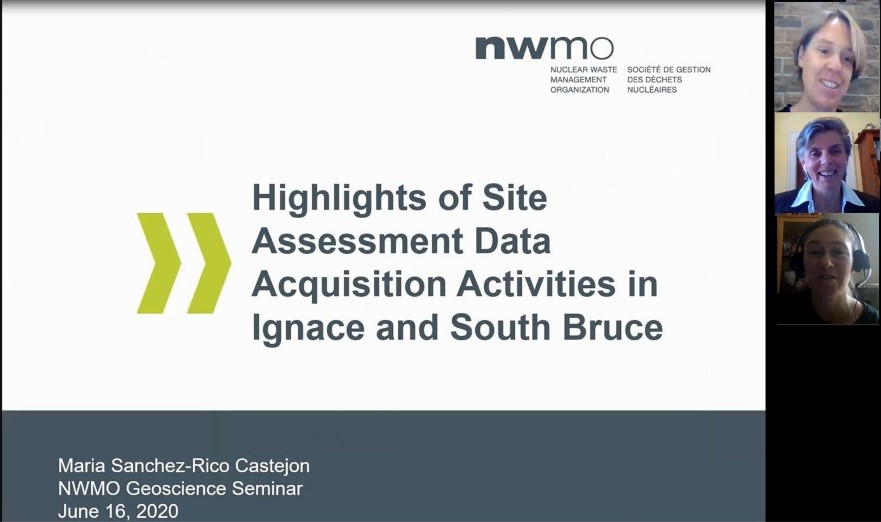Each year, the NWMO hosts a geoscience seminar to bring together geoscientists from across Canada and internationally. These scientists are conducting research that has applications for both sedimentary and crystalline rock. Both types of rock could potentially host the deep geological repository for used nuclear fuel.
This year on June 16, the NWMO held a half-day seminar virtually due to the pandemic. The event drew a record number of participants. Attendees included researchers from numerous universities, as well as members of the NWMO’s Geoscientific Review Group (GRG), the Canadian Nuclear Safety Commission (CNSC), Natural Resources Canada (Canadian Hazard Information Systems) and the Geological Survey of Canada.
“Experts from all fields of geoscience, many of whom are involved directly in the NWMO research program, come together to discuss advances in their respective disciplines at this event every year,” said Laura Kennell, a Senior Scientist in Safety and Technical Research at the NWMO. “The seminar highlights the various research programs that the NWMO undertakes and supports to ensure we are applying best practice and current scientific knowledge to all of our work activities.”
A select number of participants presented highlights from their research or introduced new projects. The new projects discussed this year focused on how climate change affects the rock. This research explores how glaciation cycles affect erosion rates and how frozen ground, also known as permafrost, can affect groundwater flow.
Dr. John Gosse, Killam Professor with the Department of Earth and Environmental Sciences at Dalhousie University, gave a presentation on the erosion of crystalline rocks by glaciers. He said of the seminar: “The display of profound synergies among geophysical, geochemical, and materials sciences; the scientific innovations that NWMO facilitates; and NWMO's participation in key international science consortia to ensure leading-edge knowledge made me proud to be a Canadian.”
Even with the online format, participants expressed interest in following up on research underway at other universities or institutions, and assessing applicability to their own projects.
Dr. Sarah Hirschorn, Director of Geoscience at the NWMO, provided an overview of progress at potential siting locations for Canada’s used fuel repository and explained how different teams at the NWMO are working together.
During the seminar, the geoscience team emphasized data interpretation and integration work being done, which will enhance conceptual models of the potential sites. The team also discussed preparations to resume field activities when appropriate.
As part of the opening to the seminar, Bob Watts, Vice-President of Indigenous Relations, and Jessica Perritt, Section Manager of Indigenous Knowledge and Reconciliation, gave a presentation on the implementation of Reconciliation at the NWMO. The discussion also highlighted the need for action to accompany changes in policy, noting that only through deliberate action can change occur, and a better future be co-created.

